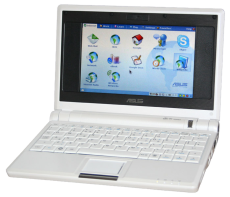Need to Know: Netbooks
Last week, Nokia unveiled its Booklet 3G, and caused controversy by insisting that it was 'not a netbook'. So what is the fuss over netbooks anyway?


The chances are that you've probably noticed the term netbook' by now it's pretty much everywhere. Recently Nokia hit the headline with a new machine, but made much of the fact that its Booklet 3G was not' a netbook, even though much of specifications made it appear to be one.
So what is a netbook?
The netbook was originally conceived as an inexpensive, but highly portable computer. The first one burst onto the scene in mid 2007 in the guise of the Asus Eee PC 700 and cost just over 200 a breakthrough price for a computer.
The term netbook' was actually originally used by British company Psion for a small computer based on the EPOC32 operating system back in 1999, and the company indeed tried to sue Intel for use of the term, but the two companies came to an agreement in June 2009.
The first few ran variations of Linux, purely for cost reasons. However, when Microsoft saw the potential loss of revenue, it cut off Linux's chances by offering Windows XP to OEMs at a cut price. Most users also proved keen to stick with Windows due to its familiarity, especially when it meant little increase in price.
Early machines also featured SSD drives which are hard disks based on flash memory with no moving parts. However, as these offered very little storage capacity, generally 8 or 16GB, as any more would have been prohibitively expensive, they were soon replaced by standard hard disks.
That said, Asus itself soon followed up its original machine with a more expensive model with better specs, and as these new models began to appear the features and then the price began to creep up. This means that in some cases it has become difficult for purchasers to see the differences between a netbook and a laptop.
Get the ITPro daily newsletter
Sign up today and you will receive a free copy of our Future Focus 2025 report - the leading guidance on AI, cybersecurity and other IT challenges as per 700+ senior executives
So exactly how do they differ?
The main differentiator between a netbook and a laptop is in two key areas screen size and the choice of processor.
First, there's size. Netbooks are designed to be smaller and more portable than the average laptop. Of course we've had ultra-portable tiny laptops for many years, but these tended to cost considerably more than standard machines, rather than less.
Netbooks tend to use a fairly low power but relatively energy efficient processor. Most use Intel's Atom processor, while some use Via's Nano.
By contrast a laptop will run a more powerful processor, such as a Core 2 Duo from Intel, or a Turion from AMD.
It will also run a different operating system most likely Windows Vista or from 22 October, Windows 7. Currently almost all netbooks run Microsoft's Windows XP, a tacit admission from Microsoft that its Vista OS is too demanding for the lighter specs on netbooks. That said there are some models that do feature Windows Vista Basic, which eschews some of Vista's more complex graphics effects. Windows 7 is light enough on its feet to work on netbooks.
Microsoft has planned to limit Windows 7 on netbooks to a Starter Edition', that was limited to having only three programs open at once, but changed its tack due to the negative industry reaction.
To give you a yard stick of performance, most current netbooks feature an Intel Atom 270, which runs at 1.6GHz. In our benchmarks, netbooks based on this achive a score of around 0.39, compared to a reference of 1.0 for a Pentium D 870, a standard desktop processor from 2005.
Benny Har-Even is a twenty-year stalwart of technology journalism who is passionate about all areas of the industry, but telecoms and mobile and home entertainment are among his chief interests. He has written for many of the leading tech publications in the UK, such as PC Pro and Wired, and previously held the position of technology editor at ITPro before regularly contributing as a freelancer.
Known affectionately as a ‘geek’ to his friends, his passion has seen him land opportunities to speak about technology on BBC television broadcasts, as well as a number of speaking engagements at industry events.
-
 Cleo attack victim list grows as Hertz confirms customer data stolen
Cleo attack victim list grows as Hertz confirms customer data stolenNews Hertz has confirmed it suffered a data breach as a result of the Cleo zero-day vulnerability in late 2024, with the car rental giant warning that customer data was stolen.
By Ross Kelly
-
 Lateral moves in tech: Why leaders should support employee mobility
Lateral moves in tech: Why leaders should support employee mobilityIn-depth Encouraging staff to switch roles can have long-term benefits for skills in the tech sector
By Keri Allan